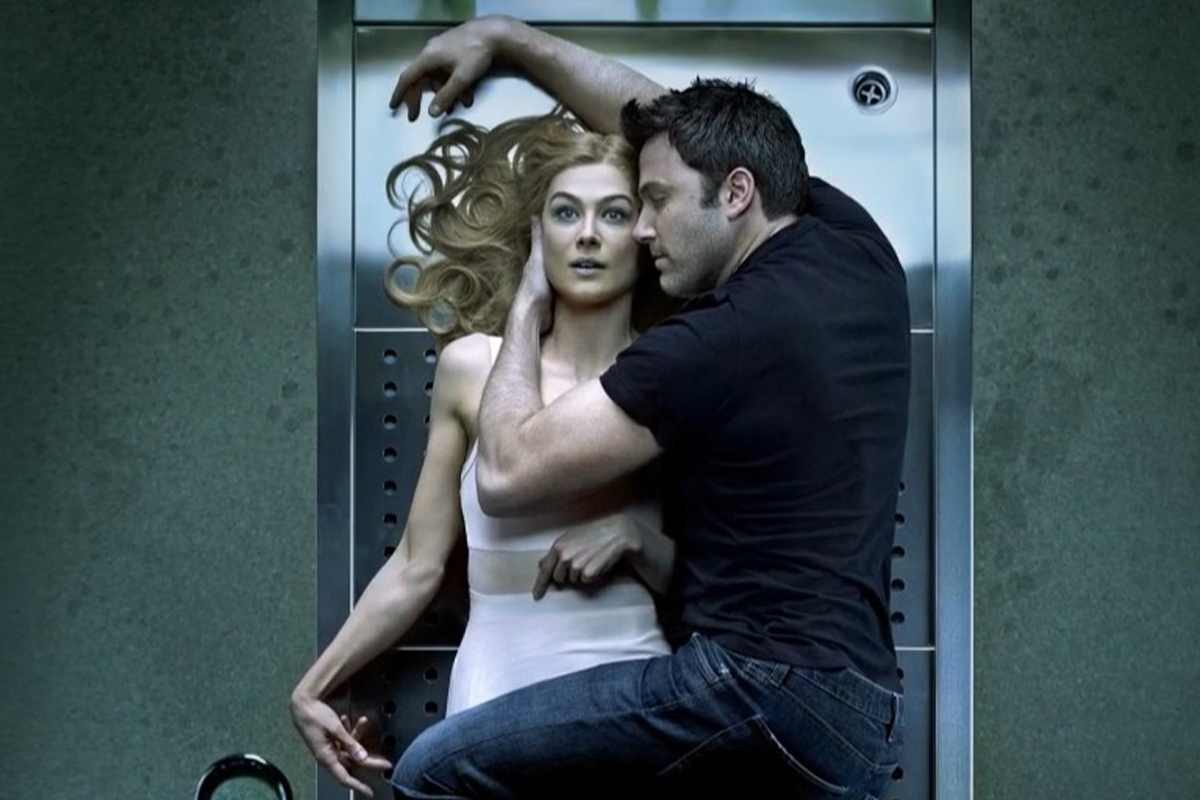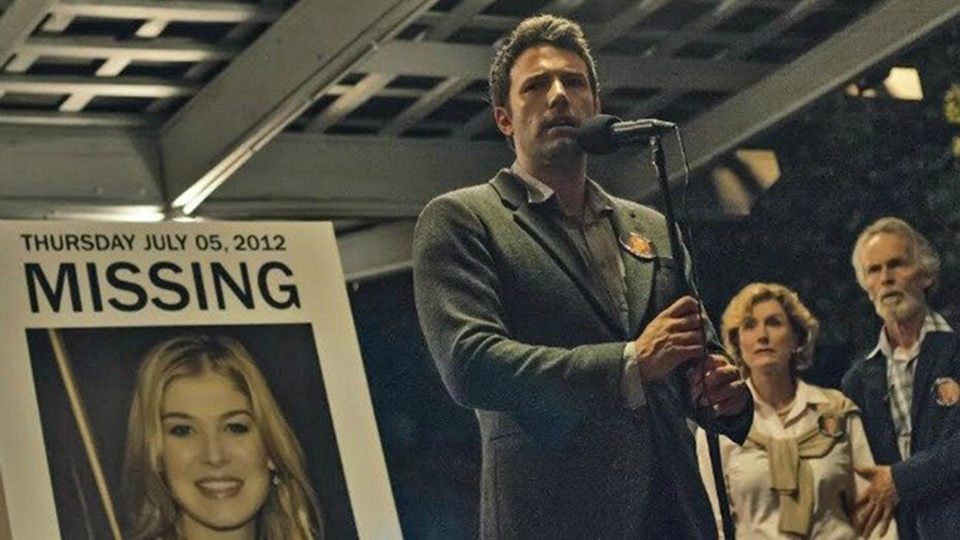Gone Girl
Posted by Jae Gibbs on 11th Oct 2014
I saw David Fincher’s latest and in box office terms alone,
greatest film so far last night at

I will exercise a great deal of restraint in this review for two key reasons: 1) It’s so hard to talk about this film without utterly spoiling it and I don’t want to do that (though there will be spoilers behind the links I post here), and 2) I have little to no idea how I actually feel about the film as a whole. To summarize: Nick Dunne (Ben Affleck) is an unhappily married man who owns a bar with his twin sister, Margo (Carrie Coon) and on his fifth wedding anniversary returns home to find his wife, Amy (Rosamund Pike) to be missing and that there is a suspicious scene in their front room. It seems pretty cut and dry from there. Local police investigate, led by Detective Rhonda Boney (Kim Dickens) and the media circus erects a national monument to itself and to the suffering of poor, missing Amy on Nick’s front lawn. Accusations fly and the audience believes only what they are shown and led to believe by the masterful direction and writing (Gillian Flynn, who wrote the novel on which the film is based also adapted the screenplay with some of Fincher’s influence).
There is fantastic acting all around, putting the final nail in the coffin of people who have always been just a little too dismissive of Ben Affleck with all their jealous, nay-saying doubts. (As a nerd and fan, I mostly wanted to see the film for him and trying to visualize him as Bruce Wayne/ Batman.
He is at once suspect and sympathetic, detestable and vulnerable, just like the character he’s portraying. This film also brings attention to many newcomers or people looking to reinvent themselves as actors: Pike is good but there’s a harder tightrope for her to walk than Affleck, as she carries the weight of the plot and needs to be sexy but classy, petty and vengeful without becoming cartoonish or bratty, and also vulnerable and powerful with each new plot twist. She’s very convincing, but there’s also a disconnect there that made a large portion of the audience roll with laughter during what I took to be the emotional crescendo of the film, a now infamous and the sole gory scene in the piece.
The real gems, both in terms of the writing and portrayal on-screen for me were the supporting characters: Margo and Detective Boney and young Officer Jim Gilpin (played by a now grown up but still adorable Patrick Fugit, whom you may remember from “Almost Famous” or “Saved”). Margo, or “Go” as she’s affectionately called is Nick’s long-suffering sister and the moral center of the twisted tale of morality and scorn. Meanwhile, Det. Boney is the only sane woman of the piece and it’s good to see a competent police officer in a crime mystery thriller, but even more satisfying that it’s a woman (who isn’t just there to serve the male gaze) as the competent, senior detective on the high-profile case. Fugit as Gilpin is there to underscore how truly brilliant both our leads and the older, wiser Boney are, but he also represents the common man without becoming cliché or flat (plus, for me it’s just good to see him acting in adult roles. I hope he can translate this turn into more leading-man status in the future). I’d never heard of many of the female leads in this film, but I could not imagine anyone else having done better in their roles. I am dying to see more from Coon, Pike and Dickens, but the fact is there are too few parts written for serious female actors, especially those over 30 and not still clinging to earlier cred as models or other sex symbols. This is all the more reason I was elated that Flynn wrote the movie herself. I actually leaned over to my husband, who I took with me on this excursion and whispered, “See, you can tell this was written by a woman: all the women are smarter than the men in it.” At the end of the picture, I’m not sure I would still stand by that particular statement.
There are hints of misogyny throughout the film, and having not read the book I can only assume they are present there as well. I am unsure if the author meant the blatant sexism and gender stereotyping as some kind of meta-textual statement about how western society pressures women to be perfect, but also makes them unlivable shrews who figuratively castrate their husbands, or if she just felt that the characters suited the genre and narrative and maybe she didn’t consider the unfortunate implications of powerful, rich, white women making false accusations against bad men possibly being justified or vindicated. I hope I’m not giving too much away here, but this movie reminded me a lot in tone and sometimes in story of other “Sexy Crime Thrillers” of the past, like “Basic Instinct” and even “Chicago”. There were also many sad allusions to real world crime, such as the Scott Peterson trial, or the OJ Simpson case, or even the horribly recent scandals that rocked the NFL and created the need for the social commentary hashtag #WhyIStayed. The whole movie should have come with a bevy of “Trigger Warnings” for anyone who had ever been a victim of sexual assault or domestic violence, regardless of gender.

A weird aside: this is the first film in which I noticed more male than female nudity, including a brief shot of Neil Patrick Harris’s full frontal manhood, which is in no way to say that men are more or even equally objectified or sexualized in “Gone Girl” than women are. Plus this movie made me like Tyler Perry, or at least not hate him for all his Tyler Perry-ness. So how do I rate or judge such a polarizing and controversial film? I love Fincher’s signature style, color coding characters (Nick is blue, for boys, Amy starts out as pink, for girls, Nick’s sister Go is shades of yellow and gray to represent her being neutral, but kind) and everything de-saturated and moody, and that’s been honed here to a diamond sharp point. But Fincher has also long been accused of having a cynical and nihilistic point of view in his movies, and I have seen that no clearer on display than here. The acting is outstanding. That writing is tight, but there are two white trash characters I enjoyed at about the halfway point that presented a loose end I would have liked to seen cleaned up, if not a full-on plot-hole. Should you go see it? I don’t know. Did I like it? Not really. Is it an objectively good film? Absolutely, yes.
It's a story of media sensationalism, petty vengeance, domestic violence, rape accusations, murder, narcissism and infidelity. If that sounds like a fun Friday night to you, be my guest. Much like many truly great thrillers, this is one of those films that you need to be prepared and in a particular mood for, and I don’t know if I was truly prepared or if I’ll ever be in the mood to delve deeper into. It’s the kind of dark, think-piece that makes you leave the theater shaking your head saying, “That was a brilliant, well-put-together and overall great motion picture… And I never want to see it again.”
For me, personally, 3 out of 5 stars. But as a critic, 5 out of 5. If you miss it, you’ll regret it.
Share:

